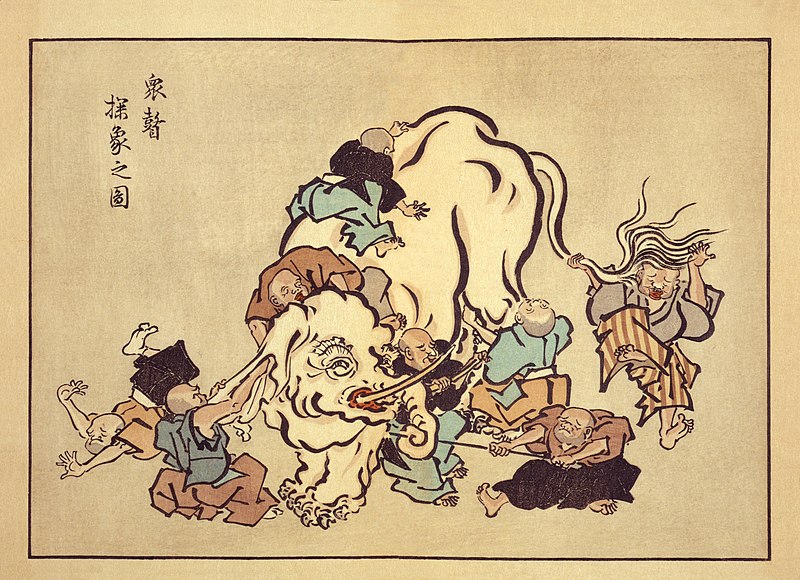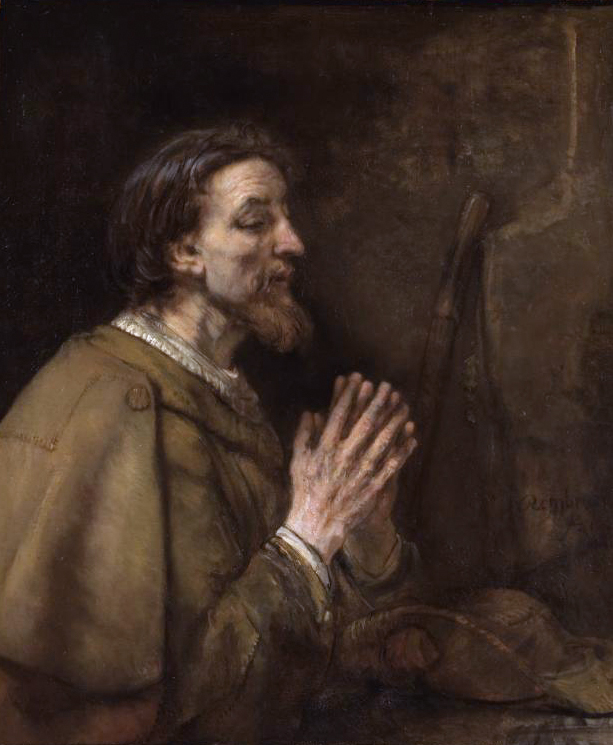
A colorful Japanese illustration of the parable of the Blind men and elephant…
* * * *
In the meantime:
October 23 is the Feast Day for James, the brother of Jesus. About which there seems to be some confusion, not least of all on my part. He’s sometimes confused with James, the son of Zebedee, also called James the Greater, “to distinguish him from James, son of Alphaeus (James the Less) and James the brother of Jesus,” also known as “James the Just.”
 According to Wikipedia – and other sources – “In the Episcopal Church of the U.S.A. and Lutheran Church, James, brother of Jesus and martyr is commemorated on October 23.” On the other hand the Feast Day for James the Greater is on July 25. See On “St. James the Greater,” posted July 24, 2014. Among other things, James the Greater is considered the “patron saint of pilgrims.” Seen at left, he is “depicted clothed as a pilgrim; note the scallop shell on his shoulder and his staff and pilgrim’s hat beside him.”
According to Wikipedia – and other sources – “In the Episcopal Church of the U.S.A. and Lutheran Church, James, brother of Jesus and martyr is commemorated on October 23.” On the other hand the Feast Day for James the Greater is on July 25. See On “St. James the Greater,” posted July 24, 2014. Among other things, James the Greater is considered the “patron saint of pilgrims.” Seen at left, he is “depicted clothed as a pilgrim; note the scallop shell on his shoulder and his staff and pilgrim’s hat beside him.”
And incidentally, in that July 2014 post I got these two Jameses mixed up, which is apparently not that uncommon. See for example The Men Named James in the New Testament – Agape Bible Study. That site listed the following men named James in the New Testament: 1) James the son of Zebedee and brother of the Apostle St. John (James the Greater); 2) James the “brother” of Jesus (whose Feast Day is October 23); 3) the Apostle James, “son of Alphaeus;” and 4) James, the father of the Apostle Jude.
So anyway, this particular “James” is considered to be the author of the Epistle of James. And according to his Wikipedia article, “As many as six different men in the Bible are named James.” All of which makes for more than the usual amount of confusion. For example:
Roman Catholic tradition generally holds that this James is to be identified with James, son of Alphaeus, and James the Less. It is agreed by most [Catholics, apparently] that he should not be confused with James, son of Zebedee.
 Be that as it may, here’s what the Wikipedia article said about this particular “10/23” James – whose “icon” is shown at right:
Be that as it may, here’s what the Wikipedia article said about this particular “10/23” James – whose “icon” is shown at right:
The Pauline epistles and the later chapters of the Acts of the Apostles portray James as an important figure in the Christian community of Jerusalem. When Paul arrives in Jerusalem to deliver the money he raised for the faithful there, it is to James that he speaks, and it is James who insists that Paul ritually cleanse himself at Herod’s Temple to prove his faith… Paul describes James as being one of the persons to whom the risen Christ showed himself … and in Galatians 2:9, Paul lists James with Cephas (better known as Peter) and John the Apostle as the three “pillars” of the Church.
Another note: The Gospel for this Feast Day is Matthew 13:54-58. It tells of Jesus returning to His home town and teaching in the synagogue. As a result, the locals were “astounded” at His teaching, and started asking, “Is not this the carpenter’s son? Is not his mother called Mary? And are not his brothers James and Joseph and Simon and Judas?”
But wait! There’s still more confusion! This time as to James’ death: “According to Josephus James was stoned to death by Ananus ben Ananus.” But “Clement of Alexandria relates that ‘James was thrown from the pinnacle of the temple, and was beaten to death with a club.'” All of which brings up the “parable of the Blind men and elephant.”
 I discussed this parable in Reading the Bible (July 2014), On the wisdom of Virgil – and an “Angel” (June 2015), and On snake-handling “redux” (May 2016). I added a new wrinkle to the “Seven Blind Men and the Elephant” with the April 2018 post, “Trump-humping” – and Christians arguing with each other. (Including the image at left.)
I discussed this parable in Reading the Bible (July 2014), On the wisdom of Virgil – and an “Angel” (June 2015), and On snake-handling “redux” (May 2016). I added a new wrinkle to the “Seven Blind Men and the Elephant” with the April 2018 post, “Trump-humping” – and Christians arguing with each other. (Including the image at left.)
The gist of that post was that Good Christians should be able to “argue” with each other – in the good sense. (The sense of “civil” lawyers presenting concise and reasoned bases to support their position, and not resorting to name-calling or “ad hominem” attacks.)
The gist of that post was also that in doing so, such “Good” Christians can fulfill their duty as “Watchmen of Christ” for each other, pursuant to Ezekiel 3:16-19 (“Task as Watchman“):
[T]he word of the Lord came to me: “Son of man, I have made you a watchman for the people of Israel… When I say to a wicked person, ‘You will surely die,’ and you do not warn them or speak out to dissuade them from their evil ways in order to save their life, that wicked person will die for their sin, and I will hold you accountable for their blood. But if you do warn the wicked person and they do not turn from their wickedness or from their evil ways, they will die for their sin; but you will have saved yourself.
So if one good Christian sees another one in error, he is duty-bound to discuss that potential error. And from the resulting “spirited debate,” both Christians may get ever closer to “the Truth.” As Wikipedia noted, the parable can be used to “illustrate a range of truths and fallacies.” For example, “one’s subjective experience can be true, but [is] inherently limited by its failure to account for other truths or a totality of truth.”
At various times the parable has provided insight into the relativism, opaqueness or inexpressible nature of truth, [as well as] the need for deeper understanding, and respect for different perspectives on the same object of observation.
Of course such “persuasion” can only work with Christians willing to admit they don’t have all the answers, or that anyone who disagrees with them is “going to hell.” (From the “very-American concept of the adversary system – a basic tenet of our legal system – as the best way of arriving at ‘the truth.’”) And which is actually based on the Bible, like in Ezekiel, Chapter 3.
The point of the parable was that each blind man, “in his own opinion,” thought the elephant was “like a wall, snake, spear, tree, fan or rope, depending upon where they had touched.” Which led to this “Moral,” from the poem by John Godfrey Saxe (1816–1887):
So oft in theologic wars, The disputants, I ween,
Rail on in utter ignorance of what each other mean,
And prate about an Elephant not one of them has seen!
And if such disputes can arise over a “mere elephant,” it’s no small wonder how many heated arguments have come over the full depth and meaning of God, a God “not one of them has seen!” Or as Apostle Paul said, “For now we see through a glass, darkly, but then face to face. Now I know in part; but then shall I know, even as also I am known.” (1st Corinthians 13:12.”
And if the Apostle Paul can admit that even he could see “only in part,” who are we to say we know “everything there is to know about God,” or dare to tell other people how to live?
All of which brings up what the great philosopher Charlie Chan once noted:
“Mind like parachute; work best when open.”
* * * *

* * * *
The upper image is courtesy of Blind men and elephant – Wikipedia. The ull caption: “Blind monks examining an elephant, an ukiyo-e print by Hanabusa Itchō (1652–1724).” This parable has “crossed between many religious traditions and is part of of Jain, Buddhist, Sufi and Hindu lore.” (Wikipedia.) In the Buddhist version, “The men cannot agree with one another and come to blows over the question of what it is like and their dispute delights the king. The Buddha ends the story by comparing the blind men to preachers and scholars who are blind and ignorant and hold to their own views.” See also Matthew 13:34 (ESV): “All these things Jesus said to the crowds in parables; indeed, he said nothing to them without a parable.“
The lower image of Charlie Chan is courtesy of amazon.com/Charlie-Collection-Honolulu-Treasure. See also Some Bible basics from Vince Lombardi and Charlie Chan, which included the Home-page quote, “Mind like parachute. Work best when open.” See also THE BASICS, above.